Photos
The champions fighting for sexual and reproductive rights in Asia and the Pacific
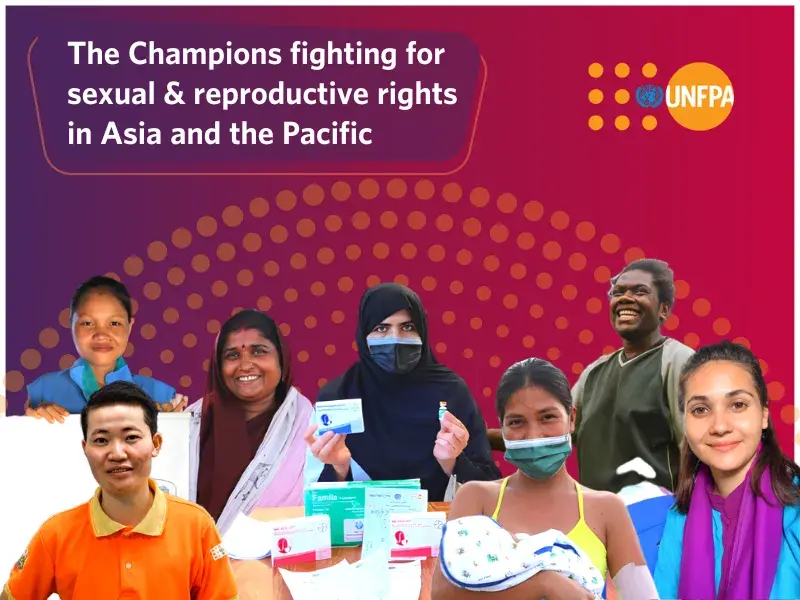
On 14-17 November, the international scientific and advocacy community as well as policy makers will be gathering in Pattaya, Thailand for the International Conference on Family Planning. The conference, for which UNFPA is one of the core organizers, provides a platform for the world’s greatest experts on family planning to exchange ideas and seek new solutions to ensure the world achieves universal access to family planning by 2030.
In the lead up to the conference, we feature the stories of seven determined women and men who are tirelessly advocating for sexual and reproductive rights in their communities with UNFPA’s support, and who have become firm believers in the importance of family planning through their own experiences. Their tales of enduring harsh conditions, defying taboos and championing the vulnerable exemplify the drive that is required from all of us to meet the needs of over 140 million women who still lack adequate access to family planning services in the region.
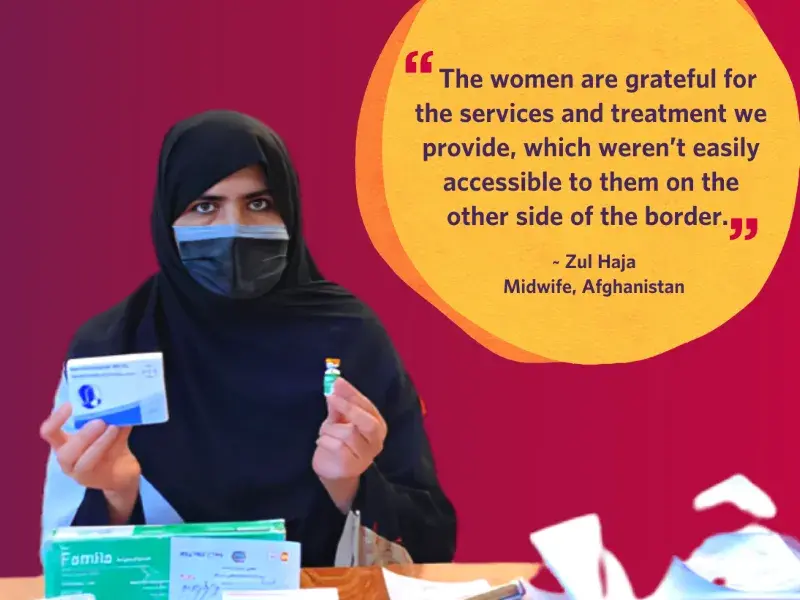
Zul Haja – midwife serving returning refugee women in Afghanistan
Due to movement restrictions and limited access to health services, the sexual and reproductive health needs of women and girls in Afghanistan have dramatically increased since the Taliban took over the country in September 2021. Reports estimate that unless urgent action is taken, the country may see 51,000 additional maternal deaths and 4.8 million unintended pregnancies by 2025.
Midwife Zul Haja works in a Zero Point clinic supported by UNFPA in the country’s Kandahar province on the border with Pakistan. In her role, Zul works around the clock to support women who are returning to the country with their sexual and reproductive health needs. Despite the ongoing humanitarian crisis embroiling the country, many women are returning to Afghanistan as a result of the grinding poverty and difficult living conditions they have faced as refugees.
“The women are grateful for the services and treatment we provide, which weren’t easily accessible to them on the other side of the border. We want to make sure that they understand the importance of addressing their reproductive health needs – and the consequences of neglecting them,” Ms. Haja explains.
Some of the services provided at the Zero Point clinic include referrals for safe deliveries, family planning counseling, treatment for sexually transmitted infections, antenatal care and basic psychosocial support. While the conditions are dire, Zul finds meaning in the fact that she is providing critical support to her fellow Afghan women in their time of need.
“I always pray that they are all well out there,” she says with a sigh as she takes a look out the clinic window and stares at the border wall separating the two countries.
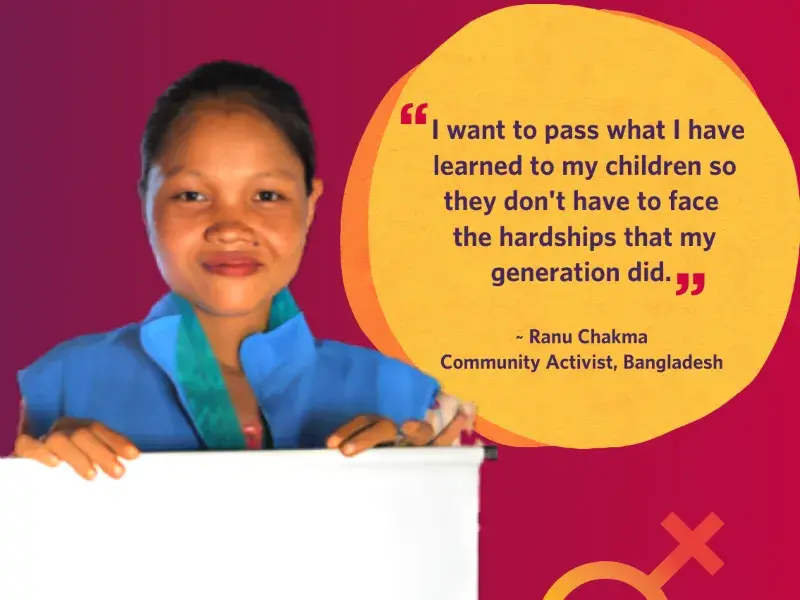
Ranu Chakma - from a child bride to a community activist against child marriage
With 52 per cent of girls married off before the age of 18, Bangladesh has the highest rate of child marriage in Asia. As a result, the country also has a high rate of adolescent pregnancies, which often result in girls dropping out of school and being confined to the domestic sphere for the rest of their lives.
This is what happened to Ranu Chakma,a member of Bangladesh’s Chakma ethnic minority near Cox’s Bazar. “I was married at the age of 14 and lost my first child during pregnancy. Because I came from a poor household, I was not able to attend school past the second grade and neither did my siblings,” she recounts.
For Ranu, there was nothing unique about her fate as she had seen countless girls go through the same process in her childhood. What changed her outlook was when she met with community activists from UNFPA’s SASA! Together social mobilization initiative in 2021.
Since 2020, the initiative has trained thousands of community members in Cox’s Bazar District to become activists against gender-based violence and harmful practices towards women and girls. The activists organize courtyard sessions and other activities to educate community members on women’s rights, birth spacing, and the negative consequences of child marriage and gender-based violence.
Learning about these topics for the first time inspired Ranu to become an activist herself. She is now a spirited champion against child marriage in her own community. “I have learned about the many ways in which power is misused in society and how we can combat it in our everyday lives. I want to pass this information to my children so they don't have to face the hardships that my generation did. I want them to grow up to be resilient, aware of their rights, and able to speak out for themselves,” Ranu says with conviction.
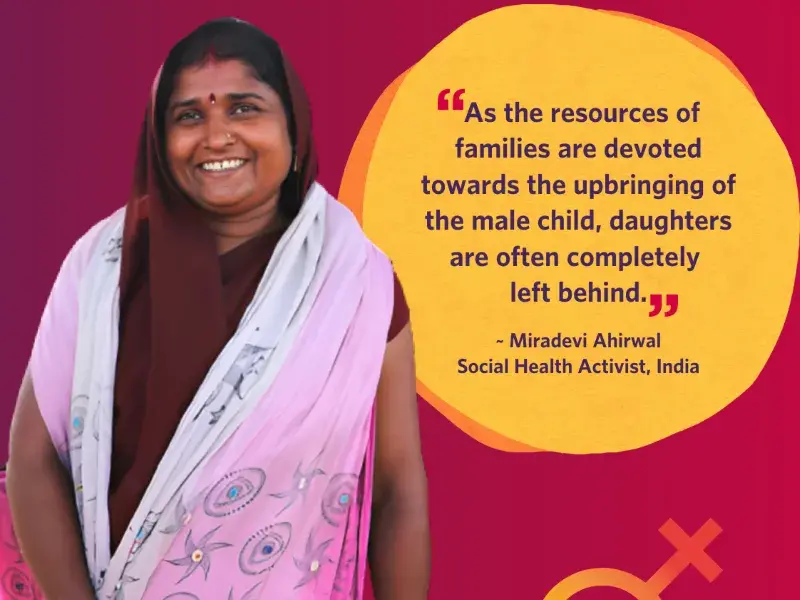
Miradevi Ahirwal – social health activist combating gender discrimination in rural India
With UNFPA’s support Miradevi Ahirwal leads a cadre of 18 accredited social health activists (ASHAs) in Chattarpur District, Madhya Pradesh, India. Under her supervision, the ASHAs regularly engage with over 10,000 local families on issues related to family planning, women’s bodily autonomy and harmful social norms.
“Son preference is a rampant social evil in our region. In my work, I come across cases where women are pressured to get pregnant again and again due to a desire for a male child. I also see the negative health outcomes of closely spaced pregnancies. As the resources of families are devoted towards the upbringing of the male child, young daughters are often completely left behind,” Miradevi explains.
Miradevi and her cadre of ASHAs aim to challenge these sentiments by educating both men and women on women’s reproductive rights, healthy pregnancy-related practices and the negative societal impact caused by discrimination towards women and girls. The cadres also counsel women in the community on different family planning methods available to them.
While a lot of work remains to be done, Miradevi feels that the example she provides as a community leader can lead to the eradication of harmful social norms. When she got married herself, she insisted on having only two children, regardless of their gender. When she and her husband had two daughters, they considered the family complete despite the opinions of their community.
“We wanted to give our two daughters the best chance at life with the finest education and opportunities. While people would taunt us about them being just girls, we never once undermined their potential. They are no less than boys, and it is only a matter of time before they spread their wings and fly,” she states with confidence.
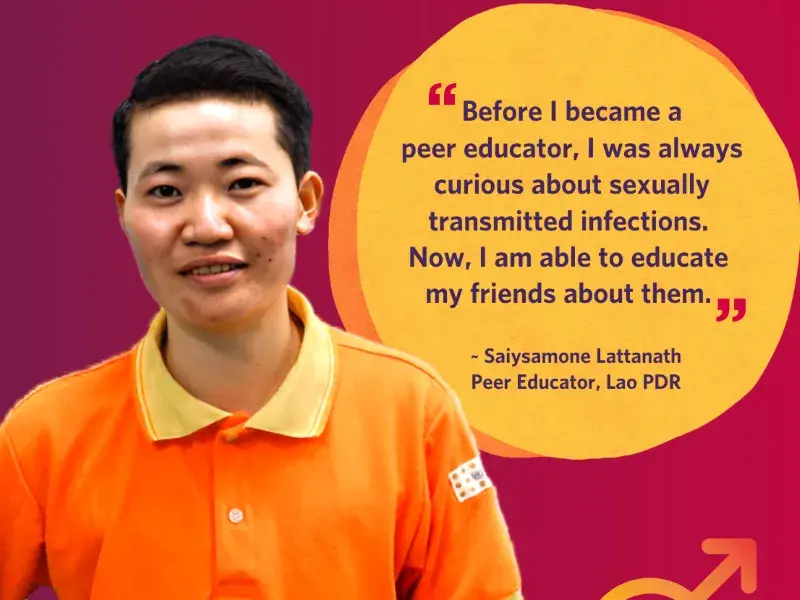
Saiysamone Lattanath – factory worker educating his peers about sexual and reproductive health in Lao PDR
To ensure the health and wellbeing of young factory workers, UNFPA and the Ministry of Health of the Government of Lao PDR have established special counseling rooms in seven factories in the country. As part of the programme, health professionals from nearby hospitals visit the rooms to raise awareness of sexual and reproductive health issues such as contraceptives and sexually transmitted infections among the workers.
In addition, the programme trains some of the employees to become peer educators whose role it is to ensure that their fellow workers feel comfortable to seek the services and information provided by local health facilities. Saiysamone Lattanath from the KP Beau Lao garment factory in Savannakhet went through the training and is now confident in supporting his colleagues with their concerns regarding sexual and reproductive health.
“Before I became a peer educator, I was always curious about STI. I didn’t have any knowledge about them, but now I am able to even educate my friends about them. At the factory, female colleagues also consult me about their concerns such as their periods. I am also glad to be able to contribute to the wellbeing of my colleagues from the LGBTIQ community,” Saiysamone says.
So far, the initiative has reached over 4,500 young workers and trained 81 peer educators like Saiysamone. With the support of UNFPA, the Government of Lao PDR plans on expanding the initiative to 17 other factories to provide these services to over 15,000 workers in the country.
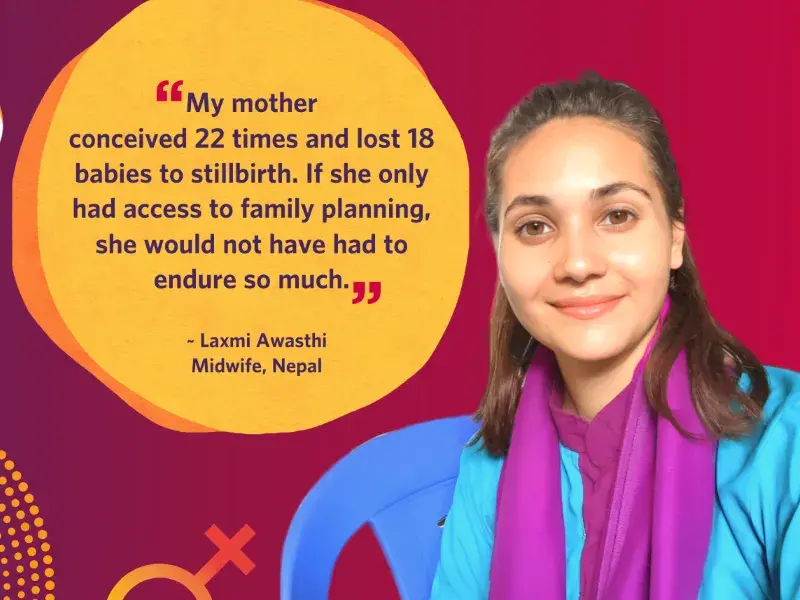
Laxmi Awasthi – midwife taking services to women’s doorsteps in rural Nepal
Between 1991 and 2016, the maternal mortality rate in Nepal declined by a staggering 72 per cent. Ever since then, progress has slowed due to a shortage of skilled birth attendants, weak referral systems and difficulty in accessing quality sexual and reproductive health services, particularly in the country’s rural areas.
28-year-old Laxmi Awasthi was determined to become a midwife after she constantly witnessed the difficulties that pregnant women faced when she was growing up in the country’s Darachula District. “My mother conceived 22 times and lost 18 babies to stillbirth. If she only had access to proper health services including family planning, she would not have had to endure so much,” she explains.
With UNFPA’s support, Awasthi currently works as an Auxiliary Nurse Midwife in Sudurpaschim Province located in the remote Western region of Nepal. In her role, Awasthi provides basic maternal health services in a local health post and makes home visits to support pregnant women and newborns. Due to the region’s poor infrastructure and mountainous terrain, it can sometimes take women days to receive the life-saving services she provides.
As midwifery services are new to the country, the local women are also not always aware of the benefits of going to a hospital during pregnancy. Midwives also face discrimination from other health workers who do not consider them as equally qualified professionals.
To respond to these challenges, the Government of Nepal has committed to creating over 10,000 professional midwife positions in the country by 2030. With UNFPA’s technical support and advocacy, the country now has a national Bachelor’s Degree programme in Midwifery, which is being offered by 5 academic institutions across Nepal.
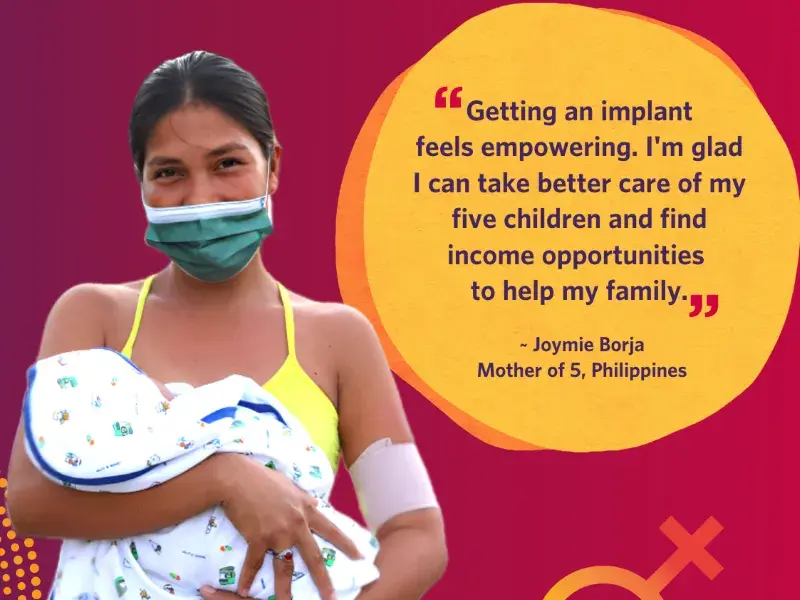
Joymie Borja - discovering family planning in a disaster zone
Access to contraceptives is often limited in the aftermath of natural disasters, which particularly put women at risk of unintended pregnancies. This was the case in the Philippines, when Typhoon Odette damaged hundreds of health facilities across the country in December 2021.
Joymie Borja was pregnant with her fifth child, when the typhoon hit her community in Pilar municipality. "All our baby essentials like clothes and blankets, which I had kept from my previous pregnancies were washed away by the typhoon, so we had to start again from nothing," she recounts.
While the local Reproductive Health Unit in Pilar was almost completely destroyed in the storm, Joymie was fortunate enough to have access to a safe delivery after the disaster in an Emergency Maternity Tent Facility (EMTF) established by UNFPA.
After her successful delivery, Joymie felt she needed to avoid another pregnancy to ensure that she and her husband were able to focus on recovering from the disaster. She discussed with elders in her community who erroneously encouraged her to drink herbal tea as a contraceptive method.
Fortunately, Joymie returned to the health facility for her postnatal check up a few weeks later. Coincidentally, a health information session on family planning methods was ongoing at the facility during Joymie’s check-up. She was stunned by the new information she learned and immediately decided to utilize one of the contraceptives advertised to her.
"Getting an implant feels empowering. I'm glad I can take better care of my five children and find income opportunities to help my husband provide for our growing family," she says with a smile on her face.
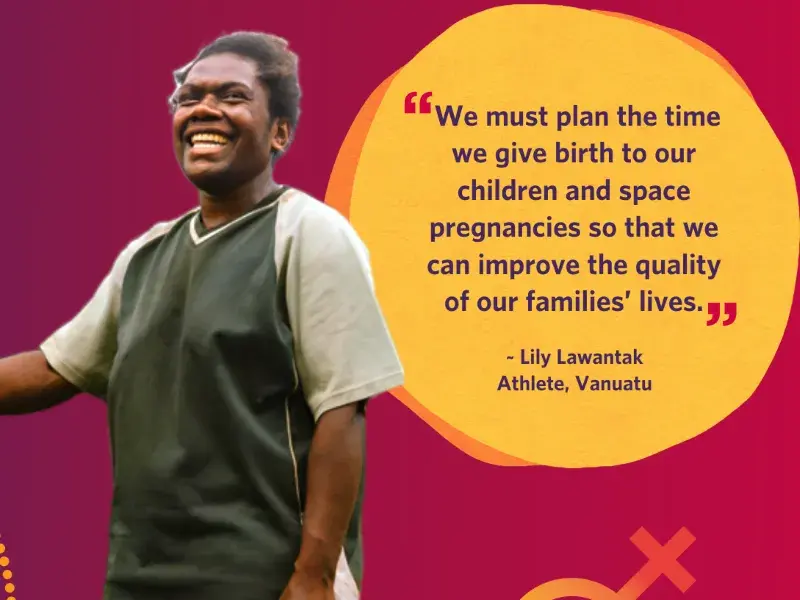
Lily Iawantak – Vanuatuan professional athlete turned family planning advocate
Around 19 per cent of women in Vanuatu have an unmet need for family planning. The country’s adolescent pregnancy rate is steadily increasing and misconceptions, such as the idea that contraceptives cause weight gain or increase promiscuity among women, prevent many from using the family planning services available to them.
“My father-in-law does not approve that I use family planning methods and many times he argues with me. One time, my husband and I were summoned to a community meeting and I was ordered not to take contraceptives by my partner’s family,” says 34-year old Lily Iawantak, a professional athlete turned family planning advocate from Vanuatu’s Tanna Island.
Fortunately, Lily’s husband Kasi has always been supportive of Lily’s wish to control the size of her family. At the meeting he defied the demands of the community and argued how family planning has been good for Lily’s health and enabled the family to provide more opportunities for their children.
“I am so blessed to have a male champion of women’s sexual and reproductive health like Kasi as my partner. Family planning is the reason I was able to pursue my dreams of becoming an athlete,” Lily says. Little by little, she has gained the confidence to advocate for family planning among her community, where women sometimes even face the threat of violence if they wish to take contraceptives.
“We must plan the time we give birth to our children and space pregnancy so that we improve the quality of our families’ lives. It is good for both men and women, and for our children, and therefore for our entire community’s future,” she says.

